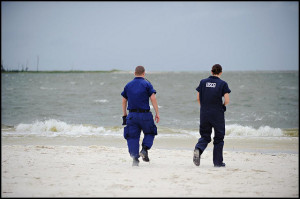We have much more to do and your continued support is needed now more than ever.
40,000-Pound Tar Mat Reminds Us the Oil Spill is Not Over
CNN is reporting that a 165-foot by 65-foot tar mat has been found in shallow water off a Louisiana barrier island beach.

BP also reported that more than 2.7 million pounds of similar oiled material have been recovered from the Louisiana coast just this year.
And while Louisiana remains ground zero for the ongoing impacts, tar balls are reported almost daily at points further east—even on popular beaches such as Gulf Shores, Alabama and Pensacola Beach, Florida.
Nevertheless, BP recently announced that the U.S. Coast Guard is ending active cleanup operations in Mississippi, Alabama and Florida. The Pensacola Daily News has reported local officials are not happy that BP has essentially handed off the job of reporting tar balls to untrained beach goers.
The Florida Department of Environmental Protection also seems to feel a more comprehensive approach is needed, as the agency has announced it is developing a volunteer-based pilot program to continue monitoring Panhandle beaches in the wake of the disaster.
Meanwhile David White, the director of the National Wildlife Federation’s Gulf of Mexico Restoration Campaign, wants BP to be held fully accountable:
“As much as one million barrels of oil from the disaster remains unaccounted for, and tar mats and tar balls from the spill continue to wash up on the coast. Regardless of how our shorelines are monitored, BP must be held accountable for the cleanup. We cannot just accept oiled material on our beaches and in our marshes as the ‘new normal.’
With oil from the spill still present on Gulf beaches and in Gulf waters, we need to be sure that BP’s oil spill fines are dedicated to ecosystem restoration—and not spent on new roads or coastal development projects.
![]() Speak up! Make sure BP’s oil spill fines are dedicated to restoring habitats for dolphins and other Gulf wildlife.
Speak up! Make sure BP’s oil spill fines are dedicated to restoring habitats for dolphins and other Gulf wildlife.





















